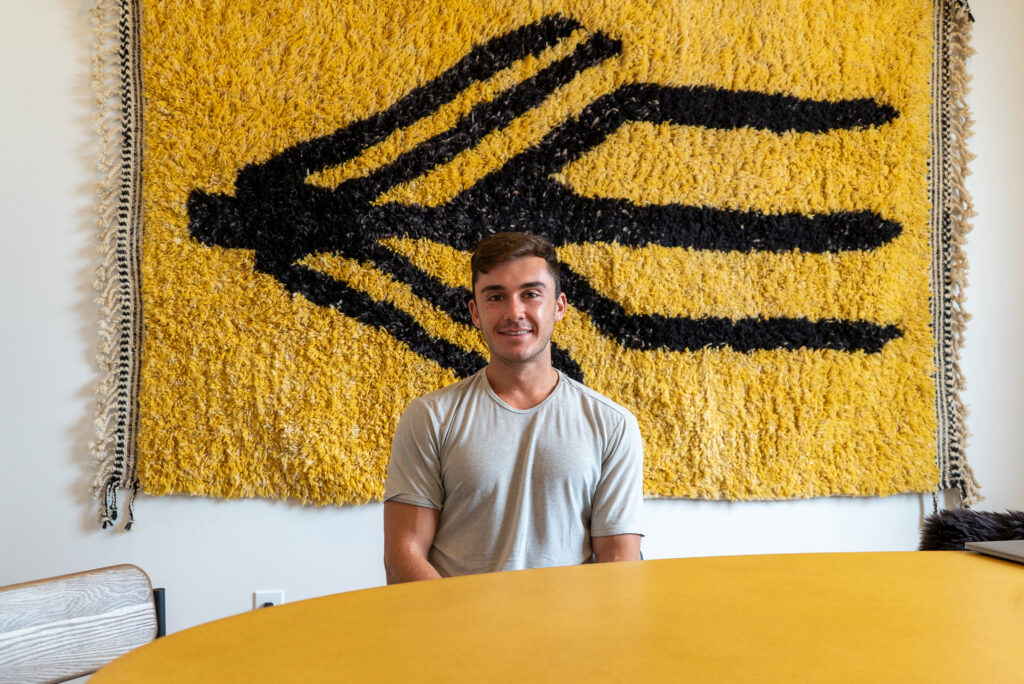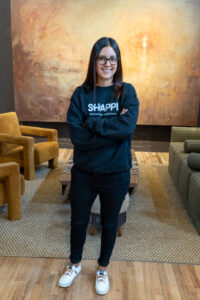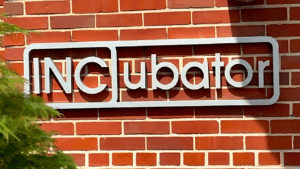Just behind Chattanooga’s Central Avenue, a community of startup founders is building and developing tomorrow’s multi-million-dollar tech companies. Backed by the venture-capital fund Brickyard, these entrepreneurs have devoted countless hours to laying the foundation for their emerging enterprises.
This incubator is part temple to the spirit of ingenuity and part monastery where near 24/7, monk-like dedication to business development has backburnered the manageable routine of a 40-hour work week.
Fortunately, Brickyard headquarters balances a state-of-the-art office environment – conference tables, private booths and 10-Gig internet service – with wellness amenities like a fully-equipped gym, and rejuvenating sauna with a cold plunge tub.
Launched by five veteran entrepreneurs, including Chattanooga locals like Bellhop’s founders Cam Doody and Matt Patterson, Brickyard’s proprietors unite under their guiding mantra, “burn the ships.” Meaning, entrepreneurs from all walks of life are invited to utilize this space to leave everything else behind in favor of intensity-of-focus on starting and growing a company.
“Founders are coming to a place they never considered living in before –into Brickyard’s four walls in order to insulate themselves from all the noise typically involved in building a new company. We believe distraction is the single greatest risk to early-stage companies and founders. We’ve sought to create a place where business owners could sequester and protect themselves from that very real threat to their success,” Doody says.
As a result, Brickyard has helped lure 15 different startup founders from around the world to Chattanooga – with several of those companies being women- or minority-owned.
TREND met with three of them to learn more about what it takes to be a highly focused founder at Brickyard:
Meet the founder: Harsh Khurana, Cultivate
Khurana immigrated to the U.S. when he was 10 years old and moved to Chattanooga via New Jersey. His passion is to help small businesses grow so his company, Cultivate, focuses on supporting mom-and-pop stores on Main Streets across the country.
What is Cultivate?
Cultivate is a browser extension that identifies and offers locally sourced alternatives to products available on Amazon. Through this extension, users can also donate money to one of Cultivate’s charity partners. Since launching in 2020, Cultivate has garnered over 25,000 users, partnered with over 5,000 stores, and donated to hundreds of charities. Backed by investors like Mark Cuban, Cultivate’s mission is to offer an easier way to shop locally while also giving back to worthwhile charities.
How does it work?
Download the extension and shop on Amazon as you normally would. Cultivate can tell you where your product comes from, then find local alternatives (within a 10-mile radius) available for same-day pickup often at a better price.
Cultivate operates on an affiliate model, earning commission on sales made through partner sites. Cultivate then takes a percentage of that commission and donates a $1.00 minimum to the user’s charity of choice. Users can increase that donation amount by earning points each time they make a purchase through the Cultivate browser extension.
The Brickyard benefit
Khurana found Brickyard through a venture-capital database and was immediately drawn to the company’s “brick layer” mentality. To him, the biggest benefit of being at Brickyard is the camaraderie he’s experienced between the entrepreneurs in his startup network.
“It comes down to, you are a product of your environment. When you’re working from home trying to build a company, you can get siloed into this mode where you’re constantly just doing one thing. Here, you get to talk to a bunch of people with the same attitude who are also just busy getting after it. It forces you to improve your game,” Khurana says.
The secret to balancing startup burnout
Despite the challenges of operating a growing startup, Khurana draws motivation and balance from his experiences as an Indian immigrant, specifically the meditative quality of exercise.
“As an immigrant, there’s no breaking me down. There is no wall, there is no burnout. To me, Brickyard is a place where I can go through those walls, get bloodied and battered and then ease off. I can go to the gym or go to the sauna and steam room, then cold plunge and just let it all out… there’s so much here that you can used to getting away from everything… For that purpose, Brickyard is incredible,” Khurana says.
Learn more at WeCultivate.us
Meet the founder: Karla Valdivieso, Shappi
Born in Ecuador, Valdivieso moved to Chattanooga from San Diego, California. Taken from the words “shipping” and “happy,” her company Shappi brings American products to Latin America via a verified network of travelers.
What is Shappi?
Shappi is an app that connects people from Latin America with verified travelers from the U.S. who have extra luggage space to tote products. The company launched as an MVP in 2019 and was accepted into Snapchat’s Yellow Program in 2021. Their most recent funding round closed in September, partnering with investors like Innovation Lab, Lightspeed and Concrete Rose. With over 200,000 app downloads, Shappi is delivering on its mission of shipping happiness.
“When people who live outside this beautiful country of ours receive a package, they just can’t wait to open it. They find their package and experience the Shappi moment – it’s like Christmas every day,” Valdivieso says.
How does it work?
A common practice throughout Latin America is to ask friends and family living abroad to bring back American-exclusive products when visiting for the holidays. Shappi takes this a step further by formally and conveniently facilitating these types of transactions through their application platform.
First, users request a delivery and then the app finds a verified traveler who can provide a U.S. shipping address. Then, U.S. products are purchased through an online store and sent to the shipping address provided. The app offers real-time tracking information so users receive status updates during shipping and at the point of arrival. When the verified traveler arrives in Latin America, Shappi then serves as the last-mile delivery service to bring the product to the app user within 24 hours of receipt.
The secret to great ideas
Valdivieso is a data-driven entrepreneur, who says great ideas come from needed solutions to common problems. Once an idea is formed, Valdivieso suggests gathering as much data as possible to know when an idea is positioned to be successful, or when to pivot instead.
“In my case, I’m the type of person who’s always looking at human behavior. I like to see what people are doing and how they’re improving their lives through technology. Even if you’re not a product person, everyone says ‘if I were [this product], I would do X.’ So just do it,” Valdivieso says.
Favorite startup moment
With over 200,000 app downloads, Shappi has become a household name in areas throughout Latin America and has even entered into everyday Spanish-language lexicon.
“What gets me out of bed in the morning is when I hear and see people commenting on what we do and how great we’re making their life; I feel like it’s still worth it. My sister lives in Ecuador and she’s overheard conversations where people say, ‘Don’t buy it here, just Shappi it.’ People are using the brand name as a verb — it’s amazing,” Valdivieso says.
Learn more at Shappi.com

Meet the founder: Isaac Eaves, Joon
Eaves developed the idea for Joon alongside co-founders, Brad Brenner and Kevin Bunarjo while studying at the University of California at Berkeley. Inspired by their early love of video games, Eaves and partners wanted to offer kids with ADHD an easy way to do chores through gaming.
What is Joon?
Joon is an app that motivates children with ADHD to stay focused and complete tasks by turning chores into quests within a digital game. Launched in 2020, the app has garnered over 5,000 paid users since January. They recently held a $2.1 million seed round of investment capital, partnering with angel investors like Y Combinator, Goodwater Capital and Cathexis Ventures. In the future, Eaves and his co-founder will look to expand the availability of Joon beyond the app platform, further delivering on their mission to foster and support neurodivergent communities.
How does it work?
Parents and childcare providers assign tasks for a child to complete. These tasks then appear on the game as “quests,” which are completed to advance in various levels of caring for a virtual pet called a “Doter.” Over time, children with attention challenges learn to better manage their ability to focus and stick to productive routines on a day-to-day basis. The app monitors the child’s progress and recommends weekly tasks to further encourage the development of healthy habits.
The secret to overcoming challenges
Eaves navigates the ups and downs of starting a business by focusing on the personal connection he has t Joon’s mission – holding onto small victories to carry him through the more challenging parts.
“Measure your success in very small things. For us it’s, ‘Let’s get 10 users by this day or one user who says they love this product.’ Little signals can show you how much people want this product and you making progress. Either you’re getting more people using your product, or the people you have are liking it more because you’re heeding their feedback. If you’re consistently improving –even if it’s really slow—that is progress so just stick to it,” Eaves says.
Final advice for entrepreneurs
Eaves offers encouragement to entrepreneurs who are looking to take the leap of faith toward starting their own business. For him and other Brickyard founders, the risk is worth the reward.
“The only way you really learn how to do something is to do it. It’s not as risky as it seems. At the end of the day, you go into a startup because you want to learn and you wat to build something. If you leave your job and in six months you realize this didn’t work out, you’ll find another job. You didn’t ‘lose’ six-months, you gained a real learning experience. It’ll end up being rewarding overall,” Eaves says.
Learn more at JoonApp.io









